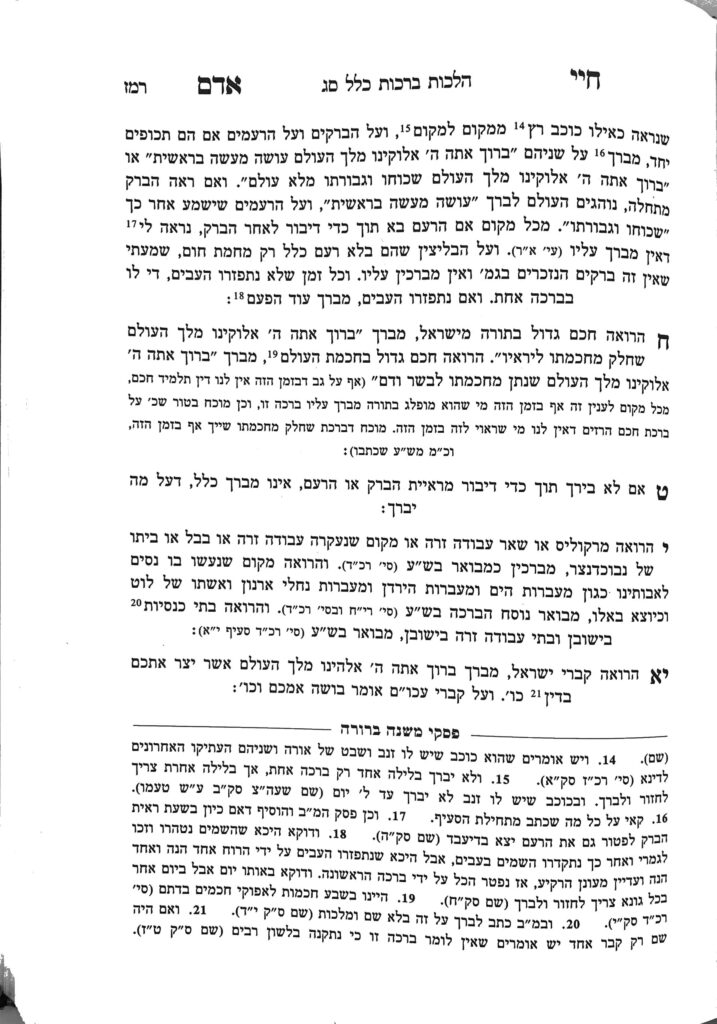We have finished siman 11, which discussed the bracha made upon seeing kevarim of Jewish people. Today, we will discuss the idea of visiting kevarim, and some of the minhagim associated with it.
The idea of visiting kevarim is already discussed in chumash. In parshas Shelach, Calev goes to Me’aras Hamachpela to daven by the kevarim of the avos, because of the special element of kedusha associated with a tzadik or the zechus and connection to a family member.
When a person visits a kever, the goal is not to ask the niftar to intercede in shamayim for them. Doing so is a called doresh el hameisim, and is not permitted. Rather, a person tries to take advantage of the kedusha associated with that place. The kedusha is the fact that the tzadik’s body served as a kli of kedusha, and even in the case of a niftar who did not keep torah and mitzvos, the very fact that they their body housed a jewish neshama gives the place an element of kedusha.
The sefer Chasidim writes that the niftar is aware of when a person comes to visit their kever. When relatives come to visit, it affects them positively in shamayim, especially when visitors daven for the aliyah of the neshama of the niftar.
Our minhag is to say seven kapitlach of tehillim: 33, 16, 17, 72, 91, 104, 130. Then, a person takes kapitel 119, and recites the pesukim which correspond to the letters of the niftar’s name and their father’s name. One then recites the pesukim which correspond to the word neshama (nun, shin, mem, hei) One does not need to recite the letters corresponding to the word ben. Afterwards, one recites the tefilla printed in the siddurim (ana Hashem, etc.). This tefilla is only recited on days on which tachanun is recited.
When visiting the kever, one should place their left hand on the matzeivah. When placing your hand on the matzeivah, one recites the following two pesukim from Yeshaya 58:11-12: וְנָחֲךָ֣ ה֮ תָּמִיד֒ וְהִשְׂבִּ֤יעַ בְּצַחְצָחוֹת֙ נַפְשֶׁ֔ךָ וְעַצְמֹתֶ֖יךָ יַחֲלִ֑יץ וְהָיִ֙יתָ֙ כְּגַ֣ן רָוֶ֔ה וּכְמוֹצָ֣א מַ֔יִם אֲשֶׁ֥ר לֹֽא־יְכַזְּב֖וּ מֵימָֽיו׃ וּבָנ֤וּ מִמְּךָ֙ חׇרְב֣וֹת עוֹלָ֔ם מוֹסְדֵ֥י דוֹר־וָד֖וֹר תְּקוֹמֵ֑ם וְקֹרָ֤א לְךָ֙ גֹּדֵ֣ר פֶּ֔רֶץ מְשֹׁבֵ֥ב נְתִיב֖וֹת לָשָֽׁבֶת׃.
After reciting the pesukim, one recites the phrase תשכב בשלום עד בא מנחם משמיע שלום.
When leaving, one should put something, generally a stone, on the matzeivah as an indication that they were there, and in an effort to build up the matzeivah.
A person should not read the writing on the matzeivah out loud, because it causes one forgetfulness. Some sources write that even reading the inscription with your eyes causes forgetfulness as well.
Summary
- One does not daven to the niftar, but rather takes advantage of the kedusha associated with that place to daven to Hashem as they regularly would.
- When visiting a kever, our minhag is to recite kapitlach 33, 16, 17, 72, 91, 104, 130 of tehillim, followed by the pesukim in 119 which correspond to the niftar’s name and their father’s name and the word neshama.
- One should place their left hand on the matzeivah and recite תָּמִיד֒ וְהִשְׂבִּ֤יעַ בְּצַחְצָחוֹת֙ נַפְשֶׁ֔ךָ וְעַצְמֹתֶ֖יךָ יַחֲלִ֑יץ וְהָיִ֙יתָ֙ כְּגַ֣ן רָוֶ֔ה וּכְמוֹצָ֣א מַ֔יִם אֲשֶׁ֥ר לֹֽא־יְכַזְּב֖וּ מֵימָֽיו׃ וּבָנ֤וּ מִמְּךָ֙ חׇרְב֣וֹת עוֹלָ֔ם מוֹסְדֵ֥י דוֹר־וָד֖וֹר תְּקוֹמֵ֑ם וְקֹרָ֤א לְךָ֙ גֹּדֵ֣ר פֶּ֔רֶץ מְשֹׁבֵ֥ב נְתִיב֖וֹת לָשָֽׁבֶת׃.
- Then they recite תשכב בשלום עד בא מנחם משמיע שלום.
- One should place a stone on the matzeivah.
- One should not read the inscription of the matzeivah aloud.



